
Jan 12
Coffee Weekly Report - 2024 01 12
Back to main blog page
- Colombia's weather has improved disparately, with some regions reporting favorable conditions in coffee-growing areas. The upcoming drier weather may aid main crop harvesting, but attention is required for the mitaca.
- Responding to reduced production in 22/23, Colombia curtailed export volumes, resulting in higher beginning stocks for the 23/24 cycle, consequently, Colombia differentials are anticipated to face pressure from stock/use levels until September.
- In conclusion, while benefiting from improved weather in specific regions, Colombia confronts a multifaceted landscape with variable climate patterns and export challenges. The anticipated production increase in 23/24 only marginally offsets recent deficits, relying on stocks for higher availability and potentially impacting differentials.
Colombian Coffee: Navigating Weather and Exports
The weather has improved in Colombia, but not uniformly. While some regions are reporting favorable vegetation indices, adequate precipitation, and suitable temperatures, this trend does not cover all coffee-growing areas (Figures 1 and 2).
Furthermore, the drier weather expected in the coming days may aid in harvesting the main crop, but attention is needed for the mitaca.
Additionally, the country reduced export volumes beyond what was necessary to accommodate the production reduction in 22/23, with producers on the sidelines, reluctant to sell at local price levels throughout the entire cycle. Consequently, the country begins the 23/24 cycle with higher beginning stocks.
Figure 1: Precipitation Anomaly (Jan 04 to Jan 11, % of normal)
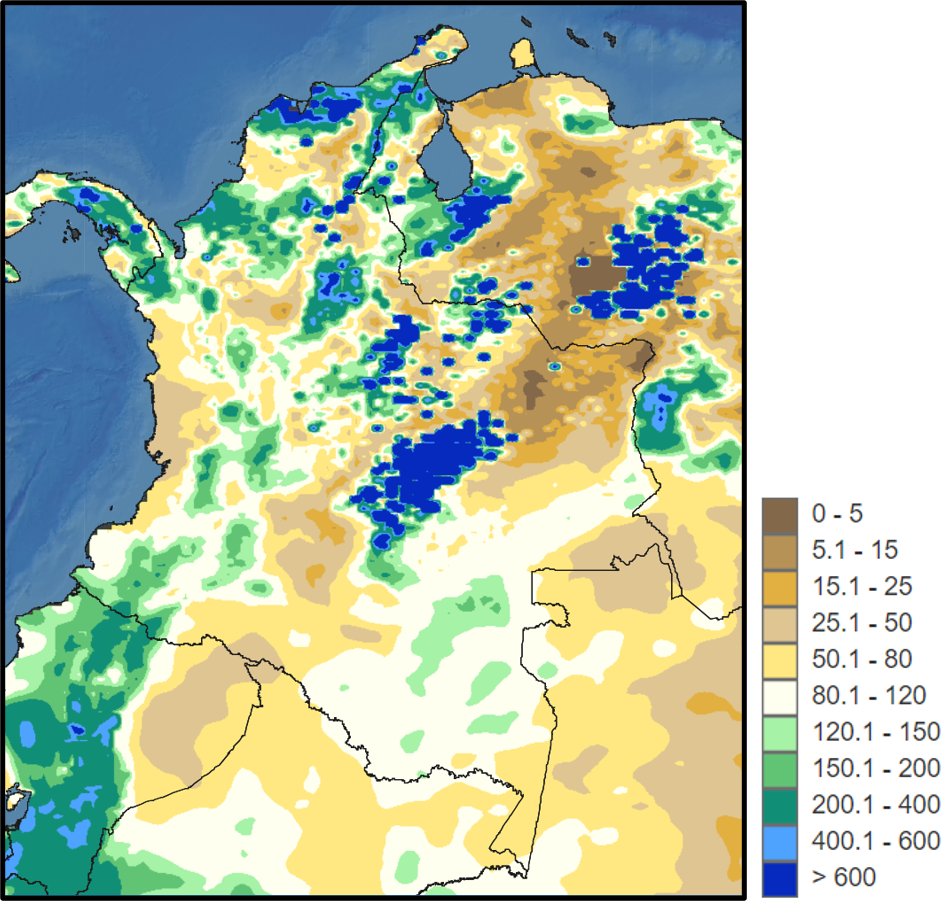
Source: USDA
Figure 2: NDVI Anomaly (Jan 03 to Jan 08)
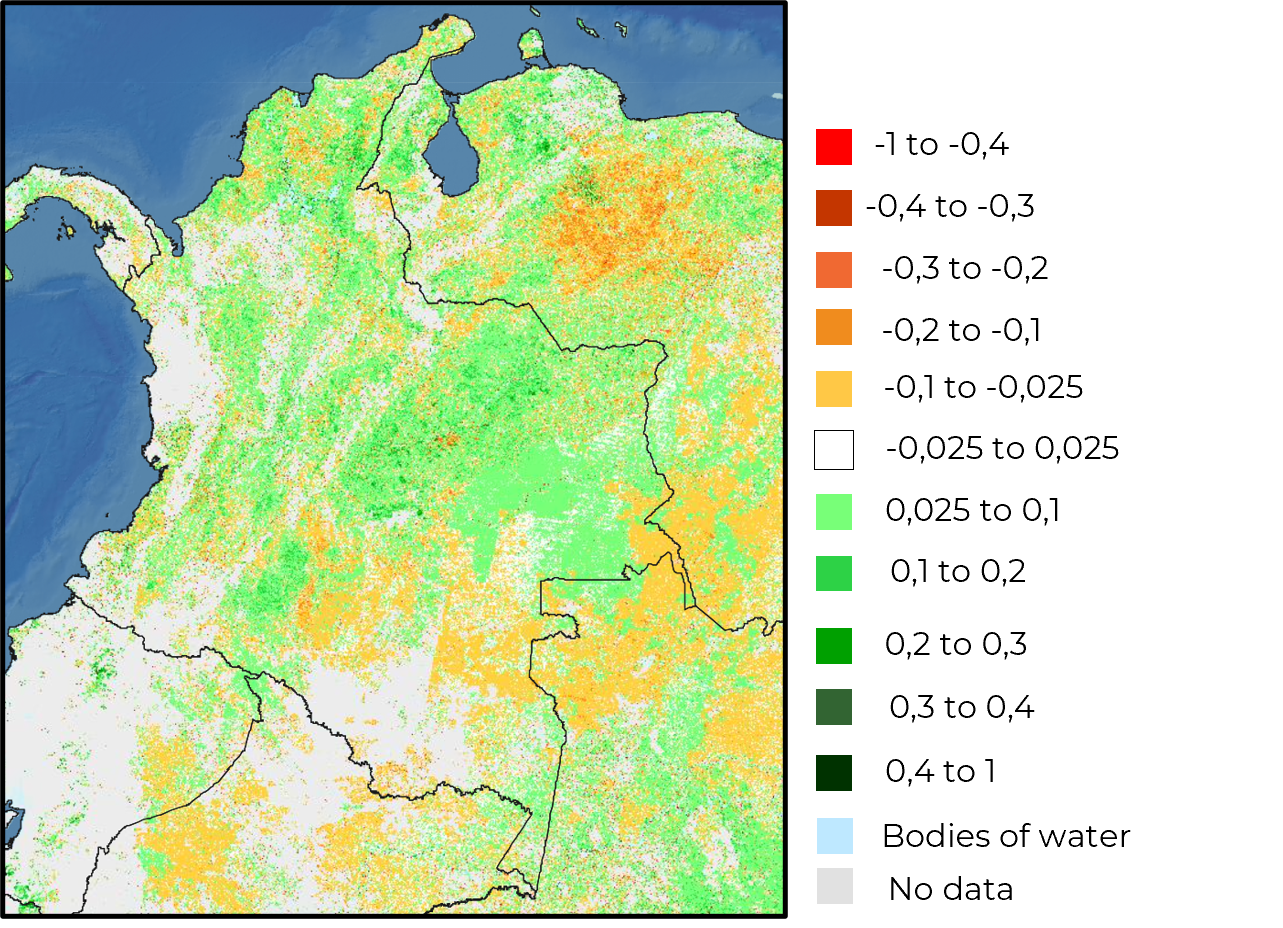
Source: USDA
.
In tandem, slightly higher production, already seen in the first months of the cycle, also contributes to the increase in availability.
The scenario suggests that Colombia differentials will remain pressured by the stock/use levels expected for the 23/24 cycle, that runs until September.
The scenario suggests that Colombia differentials will remain pressured by the stock/use levels expected for the 23/24 cycle, that runs until September.
Figure 3: Supply and Demand Balance – Colombia (‘000 bags)
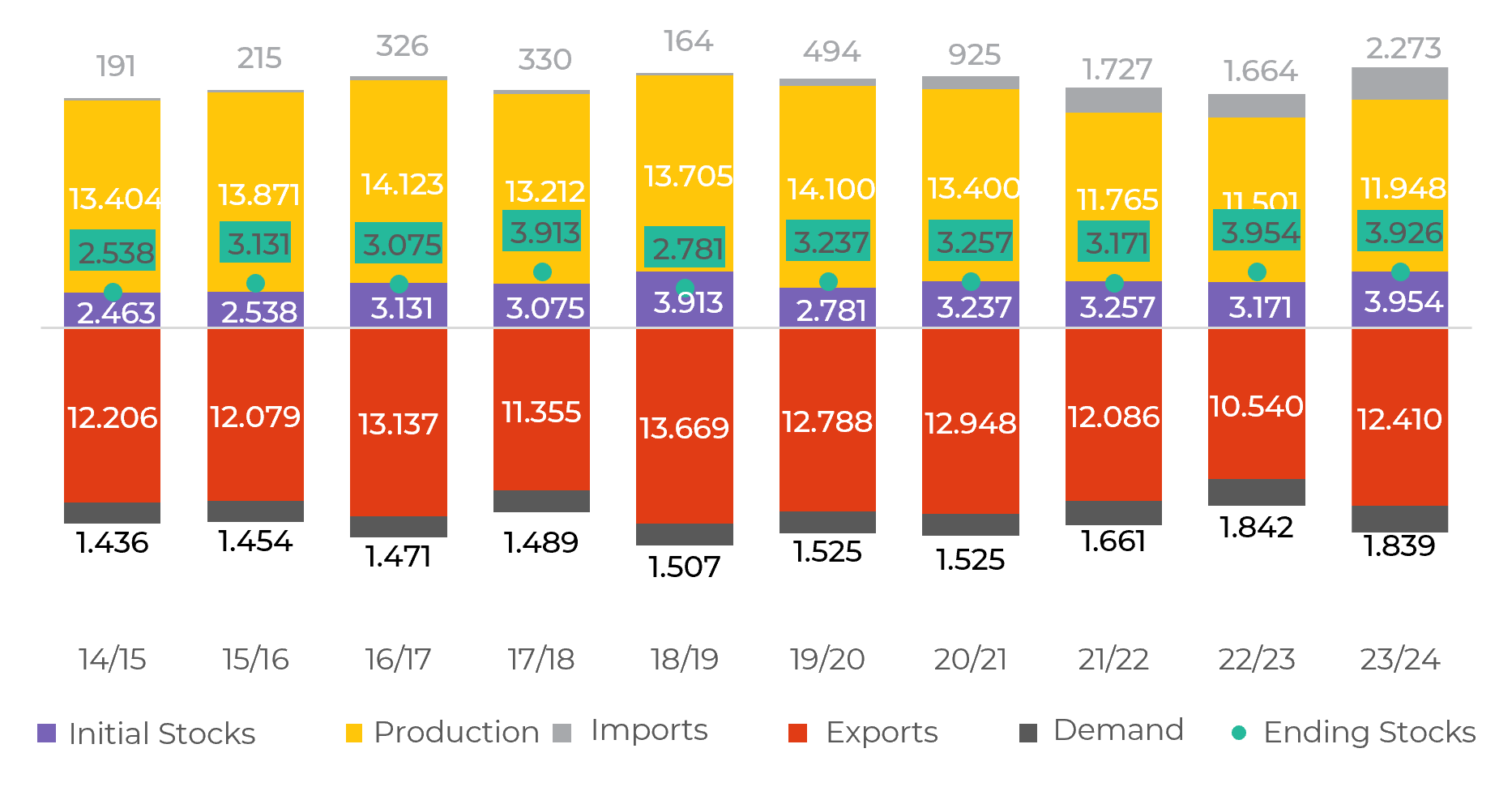
Source: hEDGEpoint
Simultaneously, there is a decline in the exports of soluble coffee in Colombia. According to the latest data released by the FNC (November 2023), Colombian exports of soluble coffee have shown a downward trend.
In 2023, the country recorded exports of 537 thousand bags, marking a 17% reduction compared to the same period in 2022 (644 thousand bags) – a trend that has been reported despite the higher total export volume in November when compared to the same period last year.
As Colombia grapples with uneven weather conditions affecting different coffee regions, the agricultural sector faces the challenges of mitigating the impact on harvests. The firm stance in initiating cycle 23/24 reflects a proactive approach to the evolving dynamics of production and export. However, the declining trend in soluble coffee exports adds a layer of complexity, highlighting the need for adaptive strategies to address changing market demands.
Figure 4: Monthly Exports – Colombia (‘000 bags)
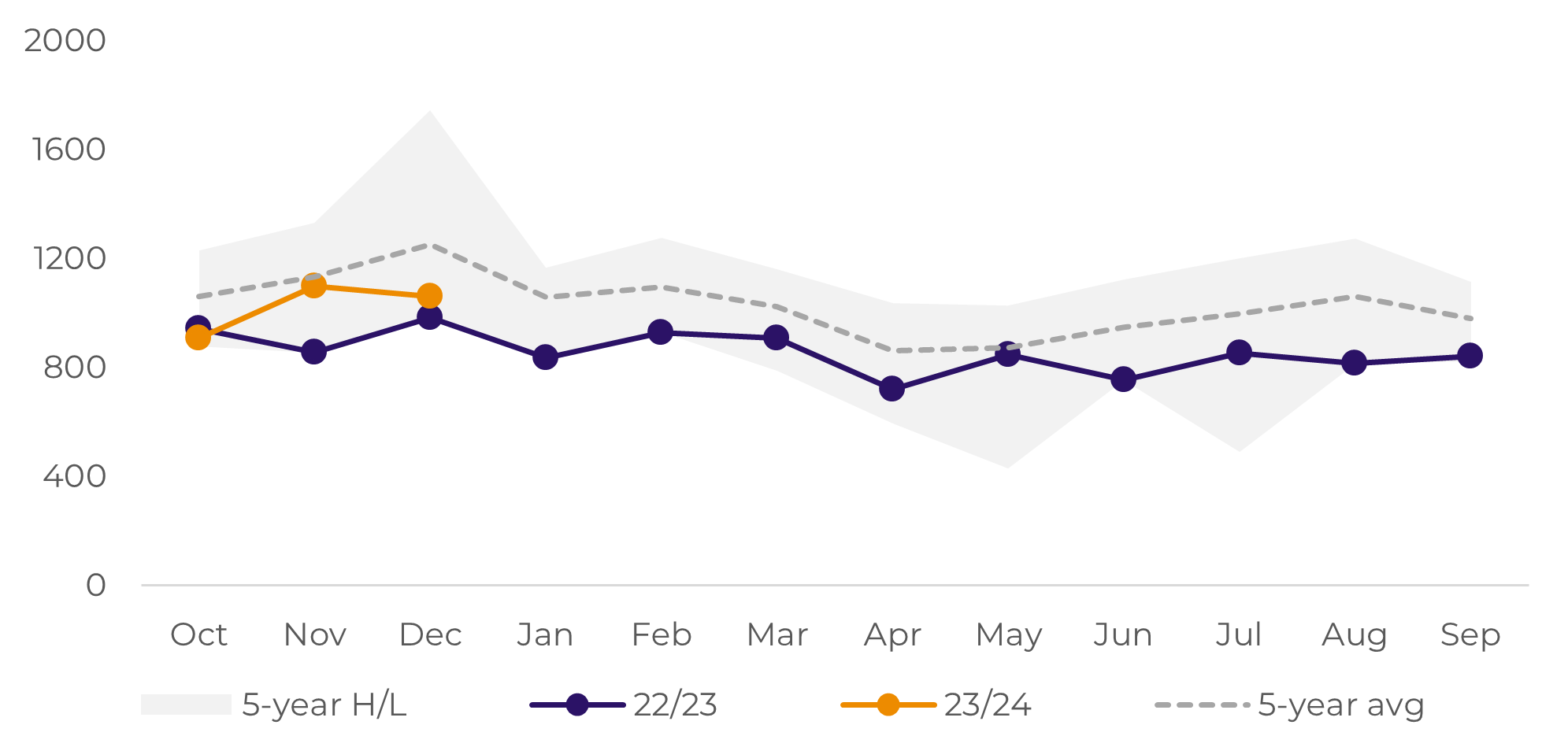
Source: FNCC
Figure 5: Soluble Coffee Exports – Colombia (60kg scs)
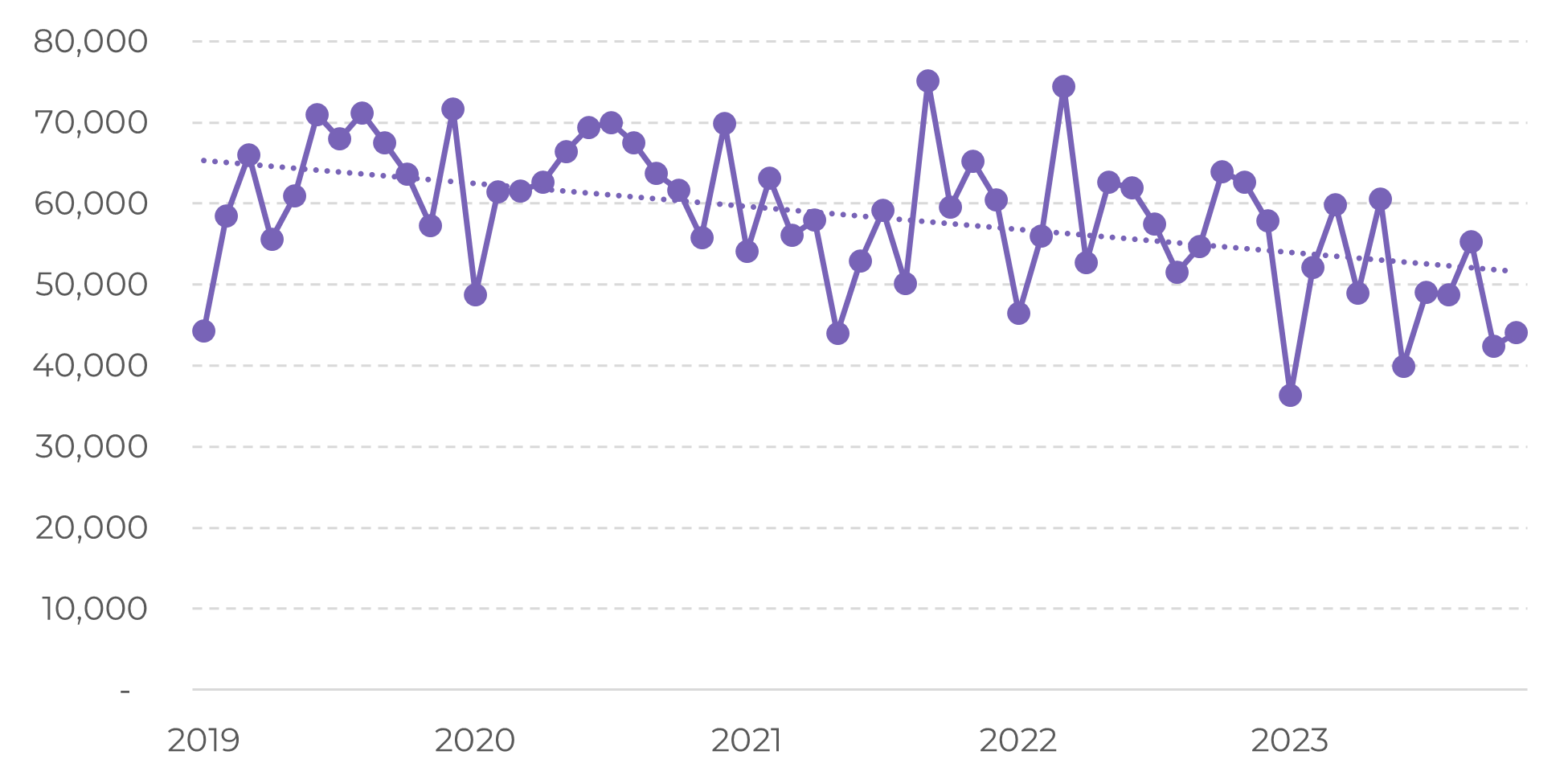
Source: FNCC
In Summary
In conclusion, while Colombia benefits from improved weather conditions in certain regions, the coffee industry is navigating a complex landscape. The challenges posed by variable climate patterns and export dynamics suggest that, while the increase in production expected for 23/24 only contributes slightly to offsetting the deficit scenario seen in the country in recent years, stocks will allow for higher availability – which, in turn, can put pressure on differentials.
Weekly Report — Coffee
Written by Natália Gandolphi
natalia.gandolphi@hedgepointglobal.com
natalia.gandolphi@hedgepointglobal.com
Reviewed by Lívea Coda
livea.coda@hedgepointglobal.com
www.hedgepointglobal.com
Disclaimer
This document has been prepared by hEDGEpoint Global Markets LLC and its affiliates ("HPGM") exclusively for informational and instructional purposes, without the purpose of creating obligations or commitments with third parties, and is not intended to promote an offer, or solicitation of an offer, to sell or buy any securities or investment products. HPGM and its associates expressly disclaim any use of the information contained herein that may result in direct or indirect damage of any kind. If you have any questions that are not resolved in the first instance of contact with the client (client.services@hedgepointglobal.com), please contact our internal ombudsman channel (ouvidoria@hedgepointglobal.com) or 0800-878-8408 (for clients in Brazil only).
Contact us
hedgepointhub.support@hedgepointglobal.com
ouvidoria@hedgepointglobal.com
Funchal Street, 418, 18º floor - Vila Olímpia São Paulo, SP, Brasil
Check our general terms and important notices.
This page has been prepared by Hedgepoint Schweiz AG and its affiliates (“Hedgepoint”) solely for informational and instructional purposes, without the purpose of instituting obligations or commitments to third parties, nor is it intended to promote an offer, or solicitation of an offer of sale or purchase relating to any securities, commodities interests or investment products. Hedgepoint and its associates expressly disclaim any use of the information contained herein that directly or indirectly result in damages or damages of any kind. Information is obtained from sources which we believe to be reliable, but we do not warrant or guarantee the timeliness or accuracy of this information. The trading of commodities interests such as futures, options, and swaps involves substantial risk of loss and may not be suitable for all investors. You should carefully consider wither such trading is suitable for you in light of your financial condition. Past performance is not necessarily indicative of future results. Customers should rely on their own independent judgement and/or advisors before entering in any transaction.Hedgepoint does not provide legal, tax or accounting advice and you are responsible for seeking any such advice separately.Hedgepoint Schweiz AG is organized, incorporated, and existing under the laws of Switzerland, is filiated to ARIF, the Association Romande des Intermédiaires Financiers, which is a FINMA-authorized Self-Regulatory Organization. Hedgepoint Commodities LLC is organized, incorporated, and existing under the laws of the USA, and is authorized and regulated by the Commodity Futures Trading Commission (CFTC) and a member of the National Futures Association (NFA) to act as an Introducing Broker and Commodity Trading Advisor. HedgePoint Global Markets Limited is Regulated by the Dubai Financial Services Authority. The content is directed at Professional Clients and not Retail Clients. Hedgepoint Global Markets PTE. Ltd is organized, incorporated, and existing under the laws of Singapore, exempted from obtaining a financial services license as per the Second Schedule of the Securities and Futures (Licensing and Conduct of Business) Act, by the Monetary Authority of Singapore (MAS). Hedgepoint Global Markets DTVM Ltda. is authorized and regulated in Brazil by the Central Bank of Brazil (BCB) and the Brazilian Securities Commission (CVM). Hedgepoint Serviços Ltda. is organized, incorporated, and existing under the laws of Brazil. Hedgepoint Global Markets S.A. is organized, incorporated, and existing under the laws of Uruguay. In case of questions not resolved by the first instance of customer contact (client.services@Hedgepointglobal.com), please contact internal ombudsman channel (ombudsman@hedgepointglobal.com – global or ouvidoria@hedgepointglobal.com – Brazil only) or call 0800-8788408 (Brazil only).Integrity, ethics, and transparency are values that guide our culture. To further strengthen our practices, Hedgepoint has a whistleblower channel for employees and third-parties by e-mail ethicline@hedgepointglobal.com or forms Ethic Line – Hedgepoint Global Markets.Security note: All contacts with customers and partners are conducted exclusively through our domain @hedgepointglobal.com. Do not accept any information, bills, statements or requests from different domains and pay special attention to any variations in letters or spelling, as they may indicate a fraudulent situation.“HedgePoint” and the “HedgePoint” logo are marks for the exclusive use of HedgePoint and/or its affiliates. Use or reproduction is prohibited, unless expressly authorized by HedgePoint. Furthermore, the use of any other marks in this document has been authorized for identification purposes only. It does not, therefore, imply any rights of HedgePoint in these marks or imply endorsement, association or seal by the owners of these marks with HedgePoint or its affiliates.
We have updated our Terms & Conditions to reflect improvements to our platform, data handling practices, and the overall experience we provide to our clients.
To continue using the Hedgepoint HUB, please review and accept the updated terms.

